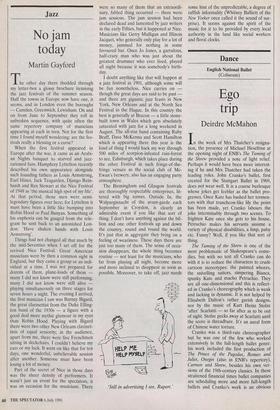Jazz
No jam today
Martin Gayford
he other day there thudded through my letter-box a glossy brochure itemising the jazz festivals of the summer season. Half the towns in Europe now have one, it seems, and in London even the boroughs — Camden, Greenwich, Lewisham. On and on from June to September they roll in unbroken sequence, with quite often the same repertory company of musicians appearing at each in turn. Not for the first time I found myself wondering: are the fes- tivals really a blessing or a curse?
When the first festival appeared in Europe after the war, it came as an Arabi- an Nights banquet to starved and jazz- rationed fans. Humphrey Lyttelton recently described his own appearance alongside such founding fathers as Louis Armstrong, Earl Hines, Jack Teagarden, Django Rein- hardt and Rex Stewart at the Nice Festival of 1948 as 'the musical high spot of my life'. At that period, those men were semi- legendary figures over here; for Lyttelton it must have been a little like bumping into Robin Hood or Paul Bunyan. Something of his euphoria can be gauged from the tele- gram he sent back to an astonished Lon- don: 'Have shaken hands with Louis Armstrong'.
Things had not changed all that much by the mid-Seventies when I set off for the revived Nice Festival. Great American musicians were by then a common sight in England, but they came a group or an indi- vidual at a time. I was not prepared for dozens of them, plane-loads of them many 1 did not know were still performing, many I did not know were still alive playing simultaneously on three stages for seven hours a night. The evening I arrived, the first musician I saw was Barney Bigard, the great clarinettist from the Duke Elling- ton band of the 1930s — a figure with a good deal more mythic glamour in my eyes than Robin Hood. Playing with Bigard there were two other New Orleans clarinet- tists of equal seniority; in the audience, apart from me, there were five Frenchmen sitting in deckchairs. I couldn't believe my ears or my luck. It went on like that for ten days, one wonderful, unbelievable session after another. Someone must have been losing a lot of money.
Part of the secret of Nice in those days was the sheer density of performers. It wasn't just an event for the spectators, it was an occasion for the musicians. There were so many of them that an extraordi- nary, fabled thing occurred — there were jam sessions. The jam session had been declared dead and lamented by jazz writers in the early Fifties, but it happened at Nice. Musicians like Gerry Mulligan and Illinois Jacquet, who generally only play for a lot of money, jammed for nothing in some favoured bar. Once Jo Jones, a garrulous, half-crazy man who was just about the greatest drummer who ever lived, played all night because it was somebody's birth- day.
I doubt anything like that will happen at a jazz festival in 1991, although some will be fun nonetheless. Nice carries on though the great days are said to be past and there are gigantic jazz feasts in New York, New Orleans and at the North Sea Festival in the Hague. In this country the best is generally at Brecon — a little stone- built town in Wales which gets absolutely saturated with jazz for a long weekend in August. The all-star band containing Ruby Braff, Dave McKenna and Scott Hamilton which is appearing there this year is the kind of thing I would hack my way through 500 miles of scorpion-infested rain-forest to see. Edinburgh, which takes place during the other Festival in such fringe-of-the- fringe venues as the social club of Mc- Ewan's brewery, also has an engaging party atmosphere.
The Birmingham and Glasgow festivals are thoroughly respectable enterprises, lit- tered with big names. Outside In, the Walpurgisnacht of the avant-garde each September in Croydon, is clearly an admirable event if you like that sort of thing. I don't have anything against the bil- lion and one other festivals up and down the country, round and round the world. It's just that in aggregate they bring on a feeling of weariness. These days there are just too many of them. The sense of occa- sion disappears, the whole thing becomes routine — not least for the musicians, who far from playing all night, become more and more inclined to disappear as soon as possible. Moreover, to take off, jazz needs `Still in advertising I see, Rupert.' some hint of the unpredictable, a degree of raffish informality (Whitney Balliett of the New Yorker once called it the sound of sur- prise). It seems against the spirit of the music for it to be provided by every local authority in the land like social workers and floral clocks.


















































 Previous page
Previous page